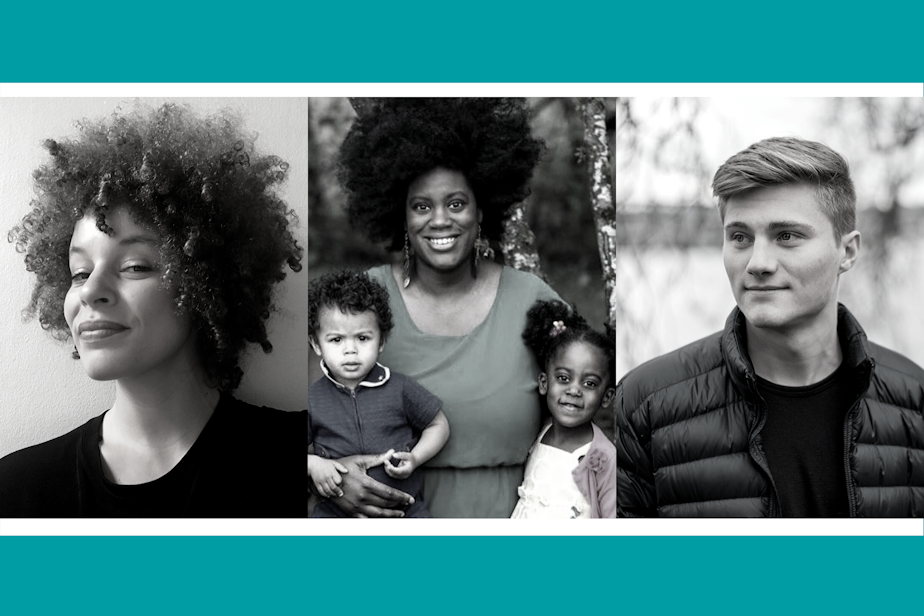Biggest Carbon Loser contestants are making deep cuts

Three contestants. Two months. One planet. A lot of carbon.
KUOW’s Biggest Carbon Loser series aims to see how deeply three Seattle-area residents can cut their carbon footprints — from travel, food, energy and more — while navigating their daily lives.
What will it take our contestants, and our region, to kick the carbon habit and help fend off climate catastrophe?
Many may try, but only one will take the coveted title: The Biggest Carbon Loser.
Halfway through their month of living less wastefully, all three contestants in KUOW's Biggest Carbon Loser contest have made major dents in their climate-harming carbon output.
The contestants each initially spent a month monitoring their day-to-day habits to establish their baseline carbon footprint. They also got advice from "carbon coaches" provided by KUOW.
Now they are in the midst of changing how they live. While the three live very different lives and face different challenges in drawing down their carbon, one person appears to be making the deepest cuts.
Will
The numbers are preliminary, and the contest is far from over, but Will Wilson has made the most dramatic break from his carbon-spewing ways.
Sponsored
In the first two weeks of February, he has dropped his daily carbon footprint by more than 90% -- from 447 pounds a day to just 36 pounds. That's measured in pounds of carbon dioxide or its equivalent in other heat-trapping gases like methane.
"It's been a lot of fun, honestly, kind of picking new ways to get around and new things to cook," he said. "I've had a lot of fun in the kitchen and getting to work. I've been taking the bus kind of consistently so that's been really good. Haven't had any major hiccups."
Will lives in Ballard and works at Expedia downtown -- locations that make transit a convenient option.
His biggest carbon-saving change? He hasn't flown since January, when he flew business class to New York, pumping the equivalent of 5 tons of carbon dioxide into the sky.
B Merikle
Sponsored
B Merikle lives outside the city, in a three-story house with her husband and two children. Like many suburb dwellers, she has a long commute into work.
B's home in Snoqualmie gets electricity and natural gas from Puget Sound Energy. The utility gets most of its electricity from coal and natural gas.
B has started telecommuting some days and has managed to cut her home's use of electricity and natural gas as well.
"Candlelight is actually really, really fun," Merikle said. "And natural light too."
"I really loved how it’s such a different, kinder, calmer, experience using the bathroom by candlelight," she said. "Really, doing anything by candlelight."
Sponsored
Most candles are made from paraffin wax, a petroleum product, so they are not without their own carbon footprint.
Another immediate option, in addition to using energy-saving bulbs and other energy-efficient devices, would be paying Puget Sound Energy an extra one cent per kilowatt-hour (on top of the usual 10-11 cents per kilowatt-hour) for the utility's carbon-free electricity, which comes mostly from wind and solar power.
Meredith
Meredith Cooper lives in Seattle's Capitol Hill neighborhood. She started the competition with the lowest carbon footprint out of the three contestants.
She drives and flies very little and doesn't buy a lot of new consumer goods. She has tried to modify her diet as a way to lower her carbon contributions. So far -- not so good.
Sponsored
"It's been a little harder than I expected," Meredith said. "To be candid, it's kind of sucked. I'm used to eating mostly vegetarian. I'm having dairy withdrawals."
Adding to this challenge is Meredith's dog, Sun Ra, who eats a lot of beef.
Beef and dairy production are among the worst contributors to carbon pollution, from the energy and fertilizers used to grow cattle feed to the heat-trapping methane that cows (and other ruminants like goats and sheep) belch.
To make matters worse, Sun Ra is allergic to chicken and fish. So Meredith said there aren't too many good options available at her pet food store.
"Systemic change is absolutely necessary. But I just don't think we get that without individually at least being aware and suffering without the cheese a little bit, you know?"
Sponsored
"If we are making demands for cheese, they're going to keep making it," she said, sticking with cheese as a tasty metaphor for high-carbon economy.
"If we're living lives where we're consuming and paying for things that have a high carbon footprint, then what's the incentive for systemic change?" she asked. "But if we are trying to change those things and demanding that there's systemic change at the same time, then I think that's probably what gets us there "





